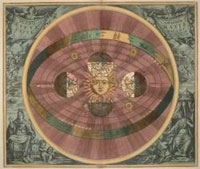Conceptual Time-Capsule Six:
Wednesday, November 15, 2006 → by Danieru There have been few great movements in favour of reason as influential as that of Galileo Galilei. In summoning the power of reason as man's faculty of authority Galileo offered the people of 17th Century Italy a route by which to bypass the Catholic dogma of the day. The heliocentric universe, once perceived and recognized by the new tools of science, was far grander in nature than the geocentric system mythologised by the church:
There have been few great movements in favour of reason as influential as that of Galileo Galilei. In summoning the power of reason as man's faculty of authority Galileo offered the people of 17th Century Italy a route by which to bypass the Catholic dogma of the day. The heliocentric universe, once perceived and recognized by the new tools of science, was far grander in nature than the geocentric system mythologised by the church: “And who can doubt that it will lead to the worst disorders when minds created free by God are compelled to submit slavishly to an outside will? When we are told to deny our senses and subject them to the whim of others? When people devoid of whatsoever competence are made judges over experts and are granted authority to treat them as they please? These are the novelties which are apt to bring about the ruin of commonwealths and the subversion of the state...“In standing against the myths of the day Galileo ploughed a scientific furrow through which the rational intercourse of the proceeding centuries would flow. Today, as a consequence of thinkers such as Galileo and the arguably more influential Charles Darwin, society believes itself capable of avoiding dogma completely, yet its perceptions are no less mythologies than the ideologies of a Catholic state. One needn't go much further than today's ‘War on Terror’ to see these mythologies in action...
~ Galileo Galilei
Much has been said on the rhetoric of the West's latest 'political crisis'. In condemning certain world regimes as 'an axis of evil' George Bush not only invoked theological symbolism to strengthen his words, but collected vastly differing political domains under one simplistic tenet. In an instant millions of people in countries as distinct as North Korea, Syria and Iran, were brought under a single meaningless header and issued with commandments of a Christian persuasion. In arguably the most infamous political speech of the 21st century the United States of America was illustrating itself, and its allies, as heroic figureheads in a battle over the forces of evil. Interestingly enough when Al Qaeda began issuing its campaign of terror through its own figurehead, Bin Laden, it too posited a hero and a villain, one directly contrasting that of the USA's. Louise Richardson in her book 'What Terrorists Want' makes much of this mirrored heroism:
"The declaration of a global war on terrorism, has been a terrible mistake and is doomed to failure... Americans opted to accept Al-Qaeda's language of cosmic warfare at face value and respond accordingly, rather than respond to Al-Qaeda based on an objective assessment of its resources and capabilities."The symbolic act of the invasion of Iraq was surely a continuation of this failure. Objectivity, perhaps even rationality itself, was rejected in favour of a mythological sensitivity. That Iraq contained 'Weapons of Mass Destruction' was irrelevant to its invasion. The act of invasion symbolised a force against an evil - one recently resurrected from a religious inheritance and one surely far more relevant to the political failures we see in Iraq today than any 'misreading of the intelligence':
"The actual reason for the failure of the US policy in its political field and international relations is their lack of information regarding the world's realities and also the enclosure of the decision making people of that country in their own fabricated and false political propaganda."This conflict between ideology and perceived intention shields a symbolic undercurrent prevalent in many areas of our culture. The human mind appears pre-programmed to veer towards a mythological structuring of reality. Pascal Boyer has written much on the inclinations of religious thought. From his book 'Religion Explained':
~ From the Weblog of Mahmoud Ahmadinejad, president of Iran, following a visit to New York in September 2006
"People are naturally prepared to believe all sorts of accounts of strange or counterintuitive phenomenon. Witness their enthusiasm for UFOs as opposed to scientific cosmology, for alchemy instead of chemistry, for urban legends instead of hard news. Religious concepts are both cheap and sensational; they are easy to understand and rather exciting to entertain"Could it be that the perceptual tools once handed us by the likes of Galileo and Darwin are growing blunt in the clash of our modern misconceptions? To suggest, as many do, that our culture is more rationally maintained than it has ever been is to fail to perceive the power which mythology and religious intention has over our uniquely evolved minds. Galileo, as they tend to say, will be spinning in his grave.
« - 01 - 02 - 03 - 04 - 05 - 06 - »

Written by
Daniel Rourke
Daniel Rourke
Categories: Future, History, God, Science, Religion, Society, Culture, Human, Politics, Philosophy, Bush, Conceptual Time-Capsule...
|
|

 Links
Links Subscribe via RSS!
Subscribe via RSS!


 Via Email
Via Email


Galileo, and others who built the scientific method, believed they were liberating humanity from ancient superstitions and cognitive restraints.
As indeed they were.
But, to paraphrase physicist David Bohm, good theories (and methods) are, unlike bad ones, true, but only up to a certain point.
We are learning, to our grief, that the scientific method and our technological infrastructure have freed us - but only up to a certain point.
We are still mostly slaves to various dogmas - some of them (such as Taylorism) spawn of the scientific age.
Needless to say, this doesn't mean we should toss out our achievements, such as they are. But we must acknowledge the demonstrated limitations of our thinking.
November 21, 2006 1:57 PM
Post a Comment